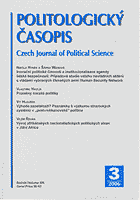Vývoj afrikánských nacionalistických politických stran v jižní Africe
The Development of Afrikaner Nationalist Political Parties in South Africa
Author(s): Vilém ŘehákSubject(s): Politics / Political Sciences
Published by: Masarykova univerzita nakladatelství
Keywords: South Africa; Afrikaners; nationalism; right wing; Conservative Party; Freedom Front
Summary/Abstract: The origin of the apartheid regime was based on the Calvinist idea of Afrikaners being “the nation privileged by God.” This idea had resulted in sharp discrimination of the African population since the 1850’s. This political process was even more strengthened during the Nationalist Party (NP) period of government after the 1948 elections. Afrikaner nationalism reached its peak in May 1961 with the unilateral declaration of an independent South African Republic. But the apartheid regime entered into a period of deep crisis at the end of the 70’s, and the fragile status quo started to become untenable. The new Prime Minister PW Botha initiated a reform process, which was refused by conservative members. They withdrew from the NP and formed the Conservative Party (CP). Its strongly nationalistic rhetoric was caused by the increasing activity of black organizations, and was reflected in the results of the 1987 elections when it became the strongest opposition party with 30% of the votes. Nevertheless, the reform process continued. The new president FW de Klerk legalized the black organizations, released political prisoners, and arranged the national referendum in which white voters decided to end the apartheid regime. Together with the consecutive loss of influential positions in the army and the death of the CP’s leader, it substantially weakened the position of the Afrikaner conservative right wing. Finally, one section of the right wing decided to terminate the boycott of negotiations and to participate in the forthcoming elections. The only Afrikaner party was called the Freedom Front (FF), but it gained only 2% of the votes. The peaceful course during and after the elections weakened the conservatives even further. In the elections of 1999 and 2004, the FF didn’t exceed even 1% of votes and is now a marginalized political party. Some militarized illegal organizations still exist in South Africa, but the government has been successful in eliminating these groups. Afrikaner nationalism still exists, but due to the evolution of the political situation it is diminishing.
Journal: Politologický časopis - Czech Journal of Political Science
- Issue Year: XIII/2006
- Issue No: 3
- Page Range: 318-333
- Page Count: 15
- Language: Czech

